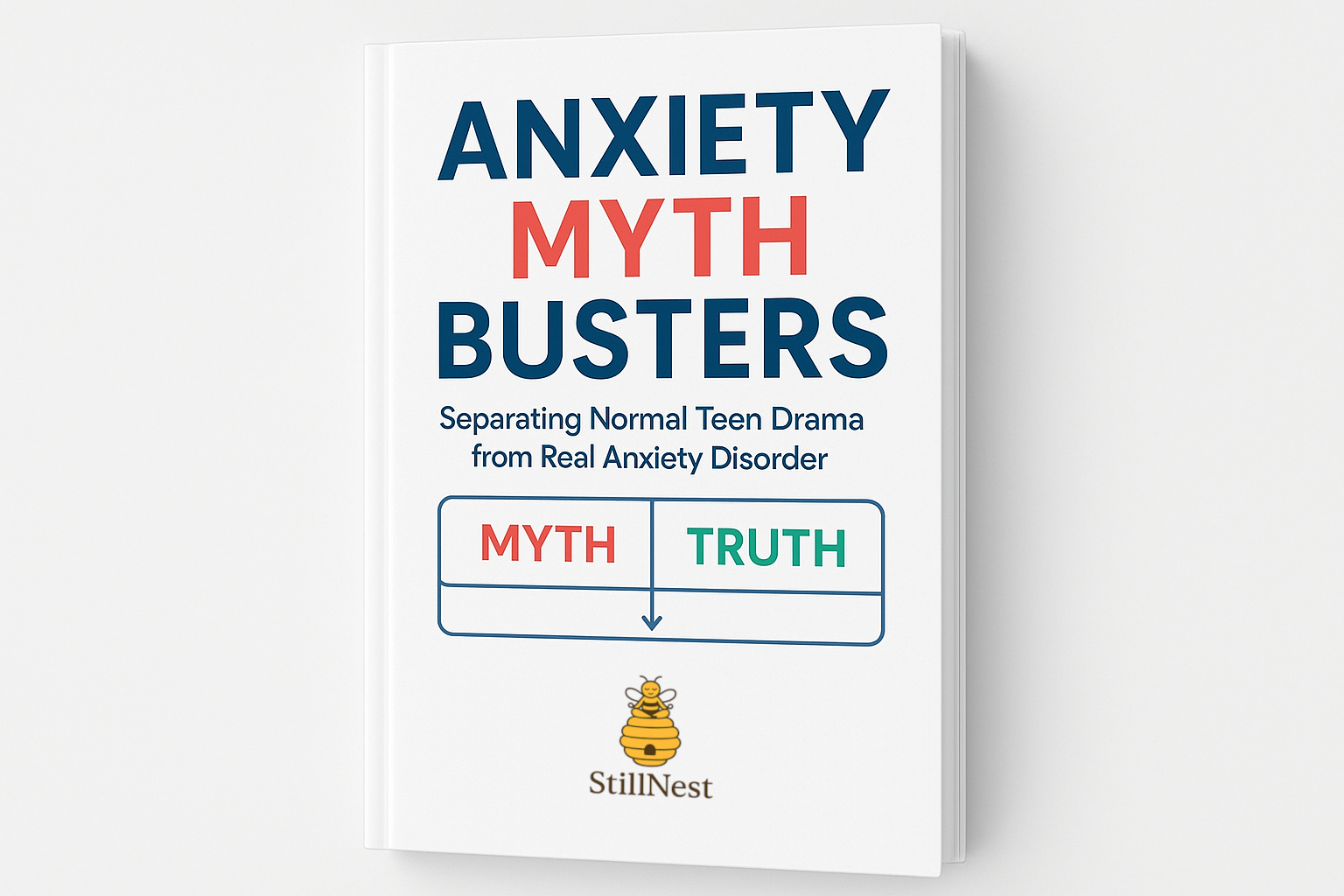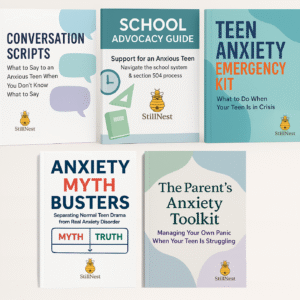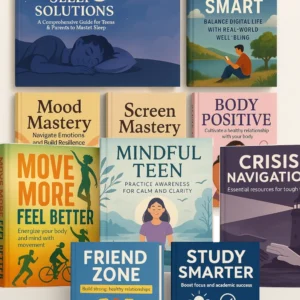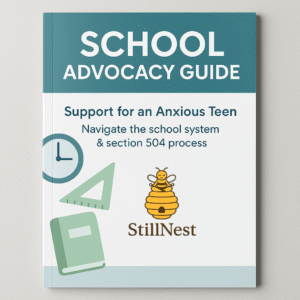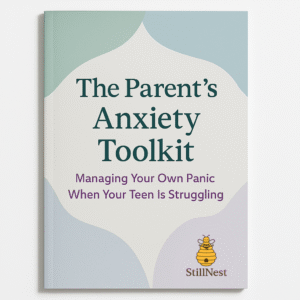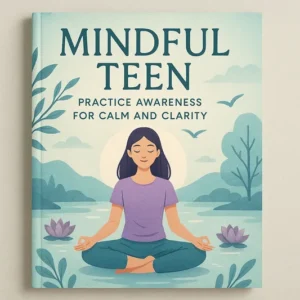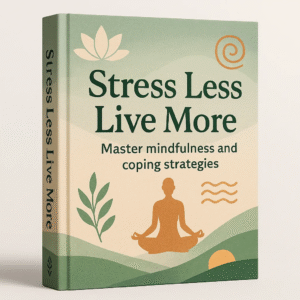Description
“Is This Just Teenage Drama… Or Something More?” ☁️
Your 16-year-old has been “sick” three times this week – always on test days. They’re convinced they’re failing everything, even though their grades are decent. They had a complete meltdown over choosing a college major when they’re only a sophomore.
Your mother-in-law rolls her eyes: “Teenagers are just dramatic. You’re coddling them.” Your neighbor shrugs: “All teens are anxious these days. It’s normal.” Even you wonder: “Am I overreacting? Is this just typical teen behavior?”
The problem? Everyone has an opinion, but no one has the facts.
💥 The Confusion That’s Keeping Parents Stuck
As one parent confided: “This sounds like normal developmental anxiety” – but how do you actually know? Another parent shared their struggle: “My teen gets very anxious and overwhelmed yet they won’t take basic steps to address the anxiety. We have talked about it many times, but she doesn’t react well to my advice.”
The line between normal teen stress and clinical anxiety has become impossibly blurred. Social media tells you every teen is anxious. Schools suggest it’s just “teenage drama.” Mental health professionals seem to diagnose everyone who walks through the door.
Meanwhile, you’re caught in the middle, wondering:
- Is my teen’s behavior normal for their age?
- When does “normal” worry become “disorder”?
- Am I missing something serious, or am I being overprotective?
- Should I be seeking professional help or just “toughing it out”?
The Cost of Getting It Wrong
If you dismiss real anxiety as “drama”:
- Your teen suffers in silence while their world gets smaller
- Academic performance crashes despite their intelligence
- Social relationships deteriorate as they avoid more situations
- Self-esteem plummets as they’re labeled “lazy” or “unmotivated”
- The anxiety worsens without proper support
If you pathologize normal teen stress:
- Your teen develops a “patient” identity instead of resilience
- Natural coping skills never develop
- Family relationships become centered around anxiety
- Normal developmental challenges become “symptoms”
- Your teen learns to avoid rather than overcome difficulties
What If You Could Finally Know the Difference?
Imagine having clear, research-based criteria for distinguishing between normal teen stress and anxiety disorder. Picture yourself confidently advocating for your teen – whether that means seeking professional help or encouraging them to push through normal challenges.
Envision family conversations where you respond appropriately to your teen’s struggles, neither dismissing real problems nor enabling avoidance of normal life challenges.
This clarity isn’t wishful thinking – it’s exactly what this guide provides.
✅ Introducing Anxiety Myth Busters – Panic attack vs Anxiety attack
This comprehensive guide cuts through the confusion, misinformation, and conflicting advice to give you clear, science-based answers about teen anxiety. You’ll finally know when to worry, when to act, and when to step back.
What You’ll Learn to Identify:
Normal Teen Stress Responses:
- Worry that’s proportional to actual situations
- Stress that motivates rather than paralyzes
- Anxiety that resolves when stressors are removed
- Coping that improves with practice and support
Clinical Anxiety Red Flags:
- Physical symptoms that interfere with daily life
- Avoidance that increases over time
- Worry that’s out of proportion to actual risk
- Functioning that deteriorates despite support
The Gray Area In Between:
- When normal stress needs extra support
- How to prevent normal anxiety from becoming clinical
- When to wait and when to seek professional help
- Supporting resilience without dismissing real struggles
Why Most Families Stay Confused
The information overload problem:
- Conflicting advice from different sources
- Social media amplifying extreme cases
- Well-meaning but uninformed family and friends
- School personnel without mental health training
The diagnostic confusion:
- Therapists who see pathology everywhere
- Insurance systems that require diagnoses
- Schools that either dismiss or over-accommodate
- Parents who fear both under-reacting and over-reacting
This guide eliminates the confusion by providing clear, research-based criteria and practical assessment tools that help you make informed decisions about your teen’s mental health.
P.S. Consider our 5 GUIDE Parent & Teen Anxiety Relief Guide Complete Bundle to get this guide PLUS 4 ADDITIONAL guides for a limited time price. Get all 5 Detailed Parent & Teen Anxiety Guides for the price of 4 + 1 FREE!
💡 Stop Guessing – Start Knowing
Every day you spend confused about your teen’s anxiety is another day of either inadequate support or unnecessary intervention. Your teen needs you to understand the difference between what they can handle and what they need help with.
Right now, your teen needs you to be informed, not just worried.
As one parent realized: “That means you have to sit with your anxiety of not being the fixer or problem solver and just let the imperfection exist.” But first, you need to know whether the imperfection is normal development or something that requires additional support.
❤️ Get Your Answers Today
Finally know the difference between drama and disorder.
